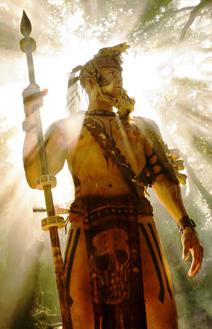Mel Gibson’s “Apocalypto” is a story about pagan Mayan Indians who offer ghastly human sacrifice to their gods, hunt tapirs to bloody deaths, and fill their leisure hours playing bawdy practical jokes on each other. It is also a deeply Christian movie, as devotional in its own way as “The Passion of the Christ,” and saturated with biblical and specifically Catholic imagery.
It’s not called “Apocalypto” for nothing: the Book of Revelation–with its theme of the end of an old world of decay and death and the beginning of a new heaven and new earth–is its central source. In a pivotal moment in “The Passion of the Christ,” Jesus, carrying his cross to Calvary, encounters his mother, Mary, and says to her, “Behold, I make all things new”–a quotation from Revelation 21 in which he reminds us that his suffering and death will bring about the redemption of the world. “Apocalypto” is about the making new of all things, of the dawning of hope and a new life–literally in the warrior-hero Jaguar Paw’s rescue of his family from enslavement by brutal Mayan overlords and the birth of his baby son, but also metaphorically, because the film is set on the very eve of the arrival of the Spanish who bring the teachings of Christ to Mexico.
The movie is not a one-for-one allegory, however, so the allusions are easy to miss. Jaguar Paw (Rudy Youngblood) is not supposed to be Jesus, and his rescue from human sacrifice via an eclipse of the sun is not supposed to be a miracle (it’s actually a clever plot use of the Mayans’ historic accomplishments in astronomy). But the Christian story is everywhere. Early in the movie, Jaguar Paw and his fellow villagers listen to storyteller narrating a creation myth: that human beings were given all the gifts that the animals of the world could give them, yet remain sad–surely a reference to the disruption of human nature caused by Adam’s fall.
The villagers try to create an idyllic enclave of peace and good feeling remote from the decadence and violence of cities–and find that such an Eden is impossible in the fallen world, for the violent city-dwellers find them and kill, rape, and enslave them nonetheless. The Mayan city itself, with its towering, slave-built temples, recalls Babel and Babylon, and the vice and cruelty therein bring to mind Sodom and Gomorrah, as well as the Roman empire in which Christianity was born.
Notably (and this is something that the anthropologists who have criticized “Apocalypto” for slighting genuine Mayan cultural achievements seem to have missed), the movie actually takes pagan Mayan religion seriously and treats it with respect–as with that creation myth, which is presented as true in its own way and beautiful. Elsewhere, a village mother who is being carted off to the slave market prays to a Mayan moon goddess, “the mother of mercy”–one of Mary’s titles, as it happens–to care for the children she is forced to abandon. The human sacrifice, in which the victim is stretched out on an altar to have his heart cut out by priests, prefigures in its gruesomely literal way the sacrifice of Christ and hence the Mass.
It is as though the Maya were trying to grope their way in darkness to Christian truth. A little girl in the movie, dying of the plague and thus abandoned by a pitiless culture that has no use for the weak, has the gift of prophecy, and her words to the brutal Mayan soldiers again recall the Book of Revelation: “The one who will be reborn is among you. He will end your world. He is with us now.” Images of water and rebirth–baptism–are everywhere in this otherwise parched and dusty Mayan setting: rain, a filling cistern, an enormous waterfall into which Jaguar Paw jumps in order to escape his murderous pursuers. As Revelation says: “I will give unto him that is athirst of the fountain of the water of life freely.”
“Apocalypto” shows us a world that is dying–from ceaseless war, from environmental destruction, from cruelty and vice and selfishness–but also a world that yearns for Christ. That world was the pagan Roman empire, it was the pre-Christian New World, and it is, of course our own suffering world. In “Apocalypto,” Mel Gibson is telling us, in the words of Jaguar Paw’s father, not to “be afraid,” not to abandon a hope that is ultimately Christian hope.
–By Charlotte Allen


